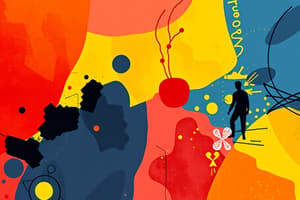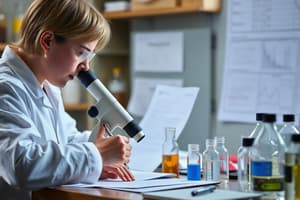Podcast
Questions and Answers
What is the primary goal of the scientific method?
What is the primary goal of the scientific method?
- To systematically answer questions about the natural world (correct)
- To analyze data using statistics
- To design an experiment or observational study
- To prove a hypothesis is correct
What is a characteristic of a hypothesis in the scientific method?
What is a characteristic of a hypothesis in the scientific method?
- It is a proven fact
- It is a personal opinion
- It is a testable possible explanation (correct)
- It cannot be disproven
What is the next step after developing a hypothesis in the scientific method?
What is the next step after developing a hypothesis in the scientific method?
- To draw conclusions about the hypothesis
- To design an experiment or observational study (correct)
- To report the findings
- To test the predictions by collecting and analyzing data
What is the purpose of analyzing data in the scientific method?
What is the purpose of analyzing data in the scientific method?
What happens if the data do not support the hypothesis in the scientific method?
What happens if the data do not support the hypothesis in the scientific method?
Why is it important to report the findings in the scientific method?
Why is it important to report the findings in the scientific method?
What is the final step of the scientific method?
What is the final step of the scientific method?
What is one of the benefits of reporting one's findings in research?
What is one of the benefits of reporting one's findings in research?
What is the primary difference between an experiment and an observational study?
What is the primary difference between an experiment and an observational study?
Why might an observational study be preferred over an experiment?
Why might an observational study be preferred over an experiment?
What is the primary distinction between a hypothesis and a theory in the scientific community?
What is the primary distinction between a hypothesis and a theory in the scientific community?
What is the purpose of a control group in an experiment?
What is the purpose of a control group in an experiment?
What is a characteristic of a scientific theory?
What is a characteristic of a scientific theory?
What is the cyclical nature of the scientific method?
What is the cyclical nature of the scientific method?
Why is a control group necessary in an experiment?
Why is a control group necessary in an experiment?
What is the purpose of a placebo in a medical drug study?
What is the purpose of a placebo in a medical drug study?
Why is replication important in scientific experiments?
Why is replication important in scientific experiments?
What are confounding variables in an experiment?
What are confounding variables in an experiment?
What is the main advantage of in vitro studies?
What is the main advantage of in vitro studies?
What is the main difference between in vitro and in vivo studies?
What is the main difference between in vitro and in vivo studies?
Why is it important to have a large sample size in an experiment?
Why is it important to have a large sample size in an experiment?
What is the main advantage of using model organisms in scientific studies?
What is the main advantage of using model organisms in scientific studies?
What is the primary goal of randomization in experiments?
What is the primary goal of randomization in experiments?
What does a p-value of less than 0.05 indicate in statistical analysis?
What does a p-value of less than 0.05 indicate in statistical analysis?
What is the main limitation of anecdotal evidence?
What is the main limitation of anecdotal evidence?
What is the main difference between correlation and causation?
What is the main difference between correlation and causation?
What is the benefit of using double-blind experiments?
What is the benefit of using double-blind experiments?
Why are human studies ideal for answering questions about humans?
Why are human studies ideal for answering questions about humans?
What is the purpose of statistical analysis in experiments?
What is the purpose of statistical analysis in experiments?
What is the main advantage of using model organisms over human studies?
What is the main advantage of using model organisms over human studies?
A hypothesis is a statement that is already proven to be true.
A hypothesis is a statement that is already proven to be true.
The scientific method involves only observation and hypothesis formulation.
The scientific method involves only observation and hypothesis formulation.
A hypothesis can never be disproven.
A hypothesis can never be disproven.
Data analysis is the final step of the scientific method.
Data analysis is the final step of the scientific method.
The scientific method is only used in natural sciences.
The scientific method is only used in natural sciences.
The scientific method involves only quantitative data analysis.
The scientific method involves only quantitative data analysis.
Reporting the findings is an optional step in the scientific method.
Reporting the findings is an optional step in the scientific method.
In a scientific study, the purpose of a control group is to receive the experimental treatment or drug.
In a scientific study, the purpose of a control group is to receive the experimental treatment or drug.
A scientific theory is a guess or an idea about how something works.
A scientific theory is a guess or an idea about how something works.
An observational study involves manipulating a variable to see what will happen.
An observational study involves manipulating a variable to see what will happen.
The scientific method is a linear process that always follows a set of fixed steps.
The scientific method is a linear process that always follows a set of fixed steps.
A hypothesis is a well-supported model of how something works with substantial evidence from multiple independent researchers.
A hypothesis is a well-supported model of how something works with substantial evidence from multiple independent researchers.
It is always possible to perform an experiment to study a phenomenon.
It is always possible to perform an experiment to study a phenomenon.
The scientific method involves proving a hypothesis to be true.
The scientific method involves proving a hypothesis to be true.
In an experiment, the experimental group is always larger than the control group.
In an experiment, the experimental group is always larger than the control group.
A placebo is a medically effective treatment used in experimental groups.
A placebo is a medically effective treatment used in experimental groups.
Replication is only necessary for experiments involving human subjects.
Replication is only necessary for experiments involving human subjects.
In vitro studies are always more reliable than in vivo studies.
In vitro studies are always more reliable than in vivo studies.
Confounding variables can be completely eliminated in an experiment.
Confounding variables can be completely eliminated in an experiment.
A large sample size is only important in human studies.
A large sample size is only important in human studies.
In an experiment, the control group should be exposed to the variable being tested.
In an experiment, the control group should be exposed to the variable being tested.
Using model organisms in a study can reduce confounding variables more easily than using humans.
Using model organisms in a study can reduce confounding variables more easily than using humans.
In a double-blind experiment, only the participants are unaware of their group assignment.
In a double-blind experiment, only the participants are unaware of their group assignment.
A p-value of 0.04 indicates that the results are likely due to chance.
A p-value of 0.04 indicates that the results are likely due to chance.
Randomization in experiments is used to ensure that participants are evenly divided between groups.
Randomization in experiments is used to ensure that participants are evenly divided between groups.
Anecdotal evidence is a reliable source of evidence in scientific studies.
Anecdotal evidence is a reliable source of evidence in scientific studies.
Correlation implies causation in scientific studies.
Correlation implies causation in scientific studies.
Human studies are often preferred over model organisms due to logistical and ethical considerations.
Human studies are often preferred over model organisms due to logistical and ethical considerations.
A single-blind experiment is considered the 'gold standard' for clinical trials.
A single-blind experiment is considered the 'gold standard' for clinical trials.
Statistical analysis is used to determine if results are due to random chance or real effects.
Statistical analysis is used to determine if results are due to random chance or real effects.
Flashcards are hidden until you start studying
Study Notes
The Scientific Method
- The scientific method is a process used to systematically answer questions about the natural world.
- The steps of the scientific method are:
- Observing a phenomenon or event
- Formulating a question
- Developing a hypothesis
- Designing an experiment or observational study
- Testing predictions and collecting and analyzing data
- Drawing conclusions
- Reporting findings
- A hypothesis is a testable, possible explanation based on objective observations.
- A hypothesis must be testable and based on objective observations.
Experiment vs. Observational Study
- In an experiment, the researcher manipulates a variable to see what will happen.
- In an observational study, information is gathered, analyzed, and compared without the researcher manipulating the variables.
- The downside of an observational study is that it may be harder to identify all contributing variables.
Science as a Cyclical Process
- Science is a cyclical and ongoing process, not a linear one.
- Findings may lead to new questions, which result in new hypotheses and new experiments.
Hypothesis vs. Theory
- A hypothesis is a testable, possible explanation.
- A scientific theory is a well-supported model of how something works with substantial evidence from multiple independent researchers.
- A scientific theory is more than just an idea or a guess.
Experimental Design
- Factors to consider when analyzing the design of an experiment or study:
- Controls: A control group is used as a baseline to compare to the experimental group.
- Sample size: A larger sample size is more representative of the population.
- Replication: Experiments should be repeated to ensure results aren't due to chance.
- Confounding variables: Variables that could impact the results, but are difficult to control for.
- In vitro or in vivo studies: In vitro studies involve studying cells or tissues outside the body, while in vivo studies involve studying entire living organisms.
- Model organism or human study: Model organisms are used to study conditions, but human studies are ideal for studying human-related questions.
- Blind experiments: Single-blind or double-blind experiments are used to reduce bias.
- Randomization: Participants are randomly assigned to control or experimental groups to reduce sample bias.
- Statistical analysis: Used to determine if differences between groups are real and not due to chance.
- Correlation or causation: Correlation doesn't imply causation, and causation requires a clear cause-and-effect relationship.
Additional Key Points
- Reporting findings allows others to build upon them and enables peer-review.
- A good scientist acknowledges the limitations of their study.
- Anecdotal evidence is not reliable and should not be used to support claims.
The Scientific Method
- The scientific method is a process used to systematically answer questions about the natural world.
- The steps of the scientific method are:
- Observing a phenomenon or event
- Formulating a question
- Developing a hypothesis
- Designing an experiment or observational study
- Testing predictions and collecting and analyzing data
- Drawing conclusions
- Reporting findings
- A hypothesis is a testable, possible explanation based on objective observations.
- A hypothesis must be testable and based on objective observations.
Experiment vs. Observational Study
- In an experiment, the researcher manipulates a variable to see what will happen.
- In an observational study, information is gathered, analyzed, and compared without the researcher manipulating the variables.
- The downside of an observational study is that it may be harder to identify all contributing variables.
Science as a Cyclical Process
- Science is a cyclical and ongoing process, not a linear one.
- Findings may lead to new questions, which result in new hypotheses and new experiments.
Hypothesis vs. Theory
- A hypothesis is a testable, possible explanation.
- A scientific theory is a well-supported model of how something works with substantial evidence from multiple independent researchers.
- A scientific theory is more than just an idea or a guess.
Experimental Design
- Factors to consider when analyzing the design of an experiment or study:
- Controls: A control group is used as a baseline to compare to the experimental group.
- Sample size: A larger sample size is more representative of the population.
- Replication: Experiments should be repeated to ensure results aren't due to chance.
- Confounding variables: Variables that could impact the results, but are difficult to control for.
- In vitro or in vivo studies: In vitro studies involve studying cells or tissues outside the body, while in vivo studies involve studying entire living organisms.
- Model organism or human study: Model organisms are used to study conditions, but human studies are ideal for studying human-related questions.
- Blind experiments: Single-blind or double-blind experiments are used to reduce bias.
- Randomization: Participants are randomly assigned to control or experimental groups to reduce sample bias.
- Statistical analysis: Used to determine if differences between groups are real and not due to chance.
- Correlation or causation: Correlation doesn't imply causation, and causation requires a clear cause-and-effect relationship.
Additional Key Points
- Reporting findings allows others to build upon them and enables peer-review.
- A good scientist acknowledges the limitations of their study.
- Anecdotal evidence is not reliable and should not be used to support claims.
Studying That Suits You
Use AI to generate personalized quizzes and flashcards to suit your learning preferences.



